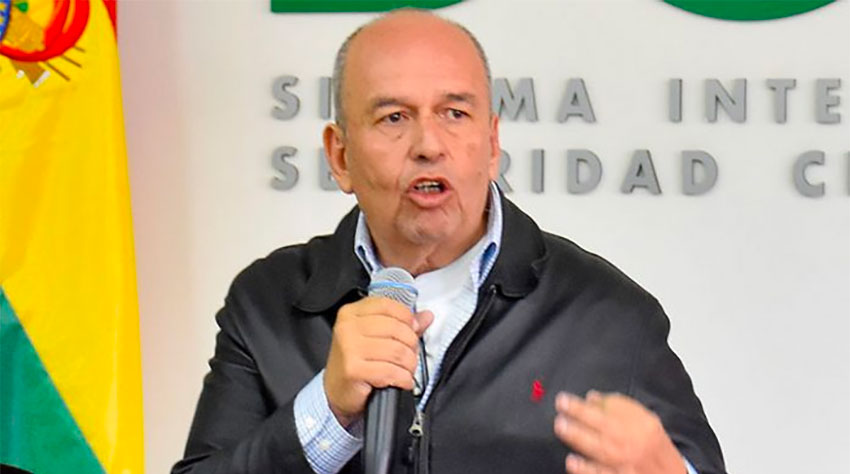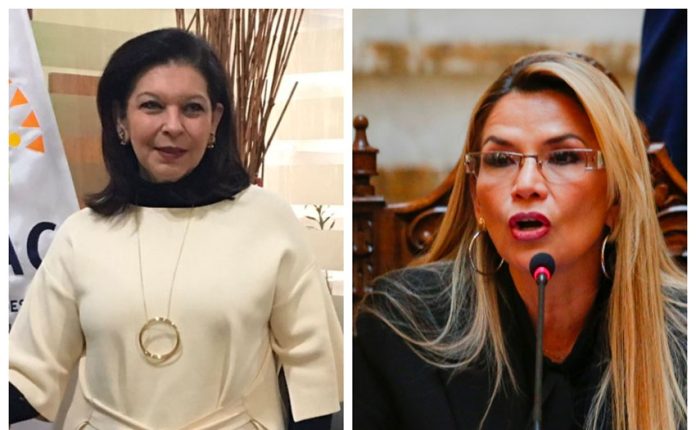Mexico’s ambassador to Bolivia returned home on Tuesday after that country’s interim government expelled her and two Spanish diplomats for allegedly colluding to help a former government official get out of the country.
The return of ambassador María Teresa Mercado came after Bolivia’s interim president, Jeanine Áñez, announced on Monday that Mercado and two Spanish diplomats had 72 hours to leave the country, declaring them “persona non grata.”
“This group of representatives of the governments of Mexico and Spain have gravely damaged the sovereignty and dignity of the people and the government,” she said.
The Secretariat of Foreign Affairs (SRE) responded in a statement that Mercado – who entered Mexico’s diplomatic service in 1982 and has received awards from other nations – has always complied with Mexico’s foreign policy principles and international law.
It said it considered Bolivia’s decision to be of “a political nature.”
The official who was allegedly going to be helped to escape the country was the interior minister in the government of ousted president Evo Morales, and one of 10 officials who sought and received asylum at the Mexican Embassy in La Paz.
The decision to expel Mercado was the latest development in a dispute between the two countries that began when Mexico granted asylum to Morales after he resigned in November amid accusations of electoral fraud.
The interim Bolivian government said Mexico violated asylum conventions by allowing Morales, who is now in Argentina, to make political declarations while in Mexico.
Providing asylum at the embassy to 10 officials from Morales’ leftist administration also angered officials of the center-right interim government.
It has issued arrests for three of the officials, including former interior minister Juan Ramón Quintana, accusing them of sedition and electoral fraud. It has refused to give them safe passage passes that would enable them to leave Bolivia.
Officials in Áñez’s interim government said the Mexican government has broken diplomatic norms by allowing the asylum seekers in its embassy to engage in political activity and travel in diplomatic vehicles.

Mexico in turn accused Bolivia last week of harassing and intimidating its diplomatic staff and described a deployment of more than 50 police and soldiers outside its embassy as “out of proportion” with the provision of security it requested in light of the unrest in the country following the disputed October 20 election.
The government also said that its embassy has been constantly filmed, drones have been flown over it and its diplomatic vehicles have been searched. Foreign Secretary Marcelo Ebrard said last Thursday that Mexico would file a complaint against Bolivia in the International Court of Justice against the “siege” on its embassy.
Spain unexpectedly became involved in the tiff last Friday when two of the country’s diplomatic vehicles – driven by masked security officers – tried to enter Mexico’s embassy in La Paz to collect the charge d’affaires. Bolivia accused Spanish embassy staff of trying to extract Quintana and other officials who face charges.
“. . . The hostile conduct [of Mexico and Spain] and attempting to enter the Mexican Embassy in Bolivia in a surreptitious and clandestine way are acts that we cannot allow to happen . . .” Áñez said when announcing the expulsion of the three diplomats.
In response, the Spanish government said it “categorically rejects any insinuation of presumed willingness to interfere in Bolivia’s internal political affairs.”
The Spanish charge d’affaires “was purely making a courtesy visit and vehemently denies there was any aim to facilitate the exit of people holed up inside the building,” the government said.
However, it didn’t explain why the drivers of its diplomatic vehicles were masked and refused to identify themselves to Bolivian police. In retaliation for the expulsion of its diplomats, the Spanish government said Monday it had declared three Bolivian diplomats persona non grata and that they too must leave the country within 72 hours.
Mexico, however, didn’t take any immediate steps to expel Bolivian diplomats, and Interior secretary Olga Sánchez Cordero said the government has no intention of breaking diplomatic ties with Bolivia.
“The embassy of our country in Bolivia continues, we will continue to work inside the embassy, there will be people in charge of embassy business . . .” she told a press conference.
Similarly, Bolivian Foreign Minister Karen Longaric said the interim government wasn’t severing ties with Mexico or Spain but rather wanted the two countries to send new diplomats to replace those who “disrespected the sovereignty of Bolivia.”
Interim interior minister Arturo Murillo told the newspaper El Universal that “we love the Mexican people a lot but reject the hostile attitude of President López Obrador.”
He also said the only reason Bolivian security forces were outside the Mexican Embassy was because there have been threats to set it on fire. Crowds of angry protesters have recently gathered outside the diplomatic mission to demand that Mexico hand over Quintana and the other wanted officials to Bolivian authorities.
“All of Bolivia’s actions have been peaceful,” Murillo said before accusing Morales of having links to drug trafficking and terrorism. The government would seek his extradition from Argentina, he added.
Murillo also accused López Obrador of having a close relationship with the family of convicted drug trafficker Joaquín “El Chapo” Guzmán, citing the government’s decision to release his son Ovidio Guzmán after he was captured in Culiacán, Sinaloa, in October as evidence of his claim.
Despite the antagonism towards the Mexican president, the interior minister said the Bolivian government wants to strengthen the relationship with Mexico.
“It’s a brother country, all we ask for is respect for our people and to be treated as an equal.”
For his part, López Obrador – who characterized the ousting of Morales as a coup – has called on the Bolivian government to respect the right to asylum.
Source: El Financiero (sp), El Universal (sp), AFP (en), The New York Times (en)
